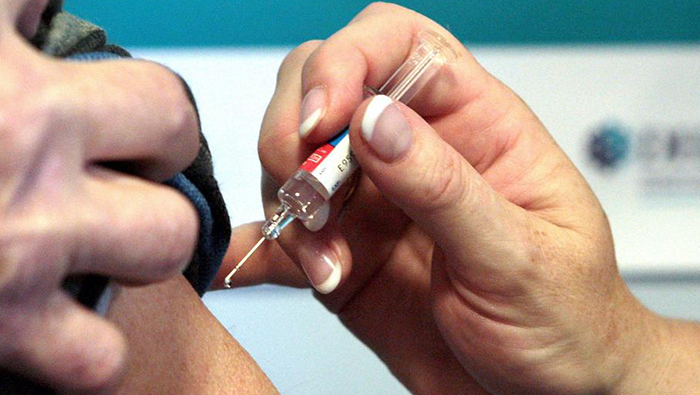
London: AstraZeneca has said that its COVID-19 vaccine should be effective against the new highly contagious coronavirus variant.
"AZD1222 (AstraZeneca's vaccine candidate) contains the genetic material of the SARS-CoV-2 virus spike protein, and the changes to the genetic code seen in this new viral strain do not appear to change the structure of the spike protein," said an AstraZeneca representative in an email to Reuters.
The representative added that its vaccine would train the immune system to "recognise many different parts of the spike protein, so that it can eliminate the virus if it is later exposed."
The mutation known as the B.1.1.7 lineage could be up to 70 per cent more infectious and more concerning for children. The new variant was found in the UK, and caused several nations to issue travel bans from people arriving from that country.
The AstraZeneca-Oxford vaccine had an efficacy of 62 per cent for trial participants given two full doses, but 90 per cent in a smaller sub-group given a half, then full dose.
Europe
Germany's infectious disease institute, the Robert Koch Institute (RKI), warned Germans to keep their guard up if they were meeting with others over the upcoming holidays.
Lothar Wieler, head of the RKI, said if too many people travel and new cases rise, Germany could face even tighter movement restrictions.
"We are worried that the infection situation will get even worse during the holidays," said Wieler.
He also warned that the new variant of the coronavirus was likely already in Germany, even though flights to and from the UK were cancelled.
"The probability that it is already in Germany, but not yet recognised, is very, very high," said Wieler.
The first deliveries of the BioNTech-Pfizer vaccine in the EU will begin on Wednesday, according to German manufacturer BioNTech.
The chief business and commercial officer Sean Marett said about 12.5 million doses were expected to be ready for use within the bloc by the end of the year. CEO Ugur Sahin said Tuesday that the vaccine, the first approved in the EU, would likely work against the new, more contagious variant.
Germany reported 24,740 new cases of the coronavirus on Tuesday, according to the latest tally by the RKI. The country now has 1,554,920 cases of the coronavirus. Meanwhile, the number of deaths from the virus increased by 962, pushing the total tally to 27,968.
Serbia will begin its vaccination program on Thursday, President Aleksandar Vucic said. It makes the Balkan state one of the first in Europe to launch a campaign with the BioNTech-Pfizer shot.
Americas
The New York Times reported Tuesday that Pfizer was nearing a new deal with the US to provide more vaccine doses. A deal could come as soon as Wednesday.
The government is asking for 100 million additional doses from April to June. The company has already signed a contract to deliver 100 million doses by the end of March. That deal was signed at the end of July 2020. As the vaccine is delivered in two doses, it would cover less than one-third of all Americans.
The US Federal Bureau of Prisons says it has begun to give vaccines to some high-risk inmates.
In a statement to the Associated Press, the agency said vaccines had been delivered to "a few" of the Bureau's facilities across the country last Wednesday, but would not say which facilities, nor how many have been vaccinated or who qualified as high risk.
Nearly 6,000 prisoners and 1,620 staff members had confirmed cases as of Tuesday. More than 29,000 inmates and 2,700 staff had recovered, but 171 fedreal inmates have died since March.
Colombian president Ivan Duque said Venezuelan migrants living in the country without proper residency permits would not be given free COVID vaccines.
Duque told Blu Radio if Venezuelans were given the shots, it could "unleash a stampede" of Venezuelans crossing the border.
The president's comments were massively rejected by health experts and migrants' rights groups, saying leaving them out would be counterproductive and unethical.